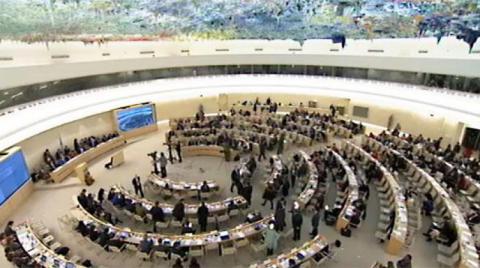
On 24 March 2016, Alkarama submitted its report on Syria's human rights record to the Human Rights Council (HRC) in view of the country's second Universal Periodic Review (UPR) – an interactive discussion between the State under review and other UN Member States on its human rights record –, which will take place next October 2016. Since Syria’s last UPR in 2011, the country plunged into a ravaging civil war, that resulted in violations of the most fundamental principles of humanity enshrined in International Humanitarian Law and Human Rights Law. Alkarama’s report raised the following key issues.
Attacks on civilians and health care facilities
In its report, Alkarama denounces that since the beginning of the conflict, the Government and its allied forces carried out indiscriminate attacks against the civilians, especially through the use of illegal weapons such as barrel bombs, cluster munitions and chemical weapons, causing the death of thousands of people. Furthermore, hospitals in areas under the control of opposition armed groups are systematically attacked, notably after the Government declared them “illegal”. Governmental forces are also responsible for sieges – of cities such as Madaya – and continuously block the access of humanitarian aid to several locations, starving entire populations.
Widespread and systematic use of torture
Despite being party to the Convention against Torture and Other Cruel, Inhuman or Degrading Treatment or Punishment (UNCAT), in Syria, torture is a widespread and systematic practice in all the detention centres under the control of the Government and allied forces; moreover, it is fostered by a general climate of impunity. Conditions of detention are degrading: deprived of food, water and access to medical care, detainees are also exposed to infectious diseases such as tuberculosis.
Arbitrary detention and enforced disappearances
Another issue of major concern is arbitrary detention. Political activists, human rights defenders, humanitarian workers as well as simple citizens are arrested and detained, often on the basis of the Anti-Terrorism Law, or enforcedly disappeared, their families being denied any information on their fate and whereabouts. Secret and incommunicado detentions are also common practice and open the door to an escalation of abuses, including the extraction of confessions under torture, as denounced by several testimonies collected by Alkarama.
Anti-Terrorism Law and Court: systematic violations of fair trial rights
Alkarama’s report also denounces the violations carried out under the pretext of the fight against terrorism. The Anti-Terrorism Law No.18 of 2012, that provides a wide definition of terrorism, is used to prosecute even non violent acts and hence, allows for the targeting of any critical voice of the Government, as well as humanitarian workers and even simple citizens. The Anti-Terrorism Court, created by Decree No. 18 of the same year, regularly sentences to death on the sole basis of information extracted under torture and following particularly flawed and expeditious trials violating all fair trial guarantees.
The report submitted by Alkarama suggests 25 recommendations to be addressed to Syria at its next UPR, in order to uphold its obligations under International Humanitarian and Human Rights Law as a matter of urgency.
The UPR involves a review of the human rights record of all UN Member States by the HRC every four years through an interactive discussion between the State under review and other UN Member States. NGOs can submit information which can be referred to by any of the States taking part in the interactive discussion. In October 2016, it will be the second time Syria will be reviewed in the framework of the UPR process.
For more information or an interview, please contact the media team at media@alkarama.org (Dir: +41 22 734 1008).
